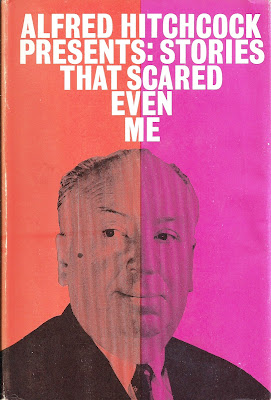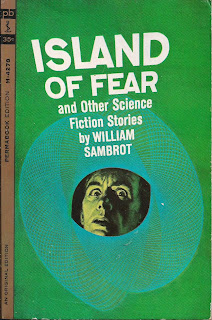Book Review: 'Alfred Hitchcock Presents: Stories That Scared Even Me'
Edited by Robert Arthur
5 / 5 Stars
'Alfred Hitchcock Presents: Stories That Scared Even Me' (463 pp.) was published in hardback by Random House in 1967. Edited by Robert Arthur, it compiles stories, novelettes, and a novel all first published during the interval from 1913 to 1967, in a variety of magazines and anthologies.
Much of the contents of 'Scared Even Me' later were repackaged in the Dell paperbacks 'Alfred Hitchcock Presents: Scream Along With Me' (1970) and 'Alfred Hitchcock Presents: Slay Ride' (1971).
However, I'm finding that the Hitchcock anthologies well are worth another look.
Below are my capsule summaries of the contents of 'Stories That Scared Even Me'. Note: in some instances, I've recycled my summaries from the Dell paperback 'Alfred Hitchcock Presents: Scream Along with Me'.
Fishhead, by Irvin S. Cobb (1913): the eponymous backwoods resident isn't someone you want to anger.
Camera Obscura, by Basil Copper (1965): a moneylender meets the intriguing Dr. Gingold.
A Death in the Family, by Miriam Allen deFord (1961): oldie but goodie about a man with peculiar habits.
Men Without Bones, by Gerald Kersh (1954): neat little tale mixing sci-fi with horror in the depths of the Central American jungle. This story originally appeared in Esquire magazine in August, 1954.
Not with A Bang, by Damon Knight (1949): the Last Man on Earth and the Last Woman on Earth face an awkward future.
Party Games, by John Burke (1965): Simon Potter, a troubled little boy, shows up at Ronny Jarman's birthday party. Rambunctious, contumacious, snotnosed urchins had best not trifle with Simon. This story demonstrates that occasionally, more graphic horror content would surface in a Hitchcock anthology.
X Marks the Pedwalk, by Fritz Leiber (1963): violent conflict between pedestrians and motorists in a near-future America. One of Leiber's best short stories.
Curious Adventure of Mr. Bond, by Nugent Barker (1965): this story originally appeared in 1939 in The Cornhill Magazine, and later in Best Tales of Terror 2, a UK horror anthology. The eponymous Mr. Bond finds himself lost on a country ramble. To his relief, he comes across an inn..........and its most peculiar innkeepers. This story relies on surrealism for its effect, but does it well, providing a creepy undertone to the proceedings.
The Knife, by Robert Arthur (1951): it's not just an ordinary utensil. I suspect most readers will see where the plot is going well in advance. I would argue that 'The Knife' ably prefigures two of the most provocative stories in Harlan Ellison's 1967 anthology Dangerous Visions.
The Cage by Ray Russell (1959): A young and scheming countess, her elderly and trusting husband, and an enigmatic overseer who dresses all in black. What could possibly go wrong ?!
It, by Theodore Sturgeon (1940): old-school tale of the predecessor to the 'swamp monsters' of the 1970s (like the Man-Thing and the Swamp-Thing).
Casablanca, by Thomas M. Disch (1967): a middle-aged American couple, self-absorbed and dismissive, find their vacation in Morocco abruptly upended.
First published in New Worlds magazine, this is a very well-plotted and well-written story, with low-key sci-fi overtones. 'Casablanca' had me concluding that when Disch wasn't trying so hard to turn out 'speculative fiction' pieces (like 'The Squirrel Cage') for the New Wave movement, he was quite capable of writing very good, 'traditional' short stories.
The Road to Mictlantecutli, by Adobe James (1965): Morgan, a ruthless criminal, is travelling on a deserted road in Mexico. The strange sights and passions he encounters will lead him to change his life........for good, or for ill.
'Adobe James' was the pseudonym of American writer James Moss Cardwell (1926 – 1990), who had his short stories published in a variety of magazines and anthologies during the 1960s, 1970s, and 1980s.
'Road' first appeared in issue 20 of the Adam Bedside Reader, and went on to be a staple entry in many anthologies, including The Sixth Pan Book of Horror Stories (1965) and The Arbor House Treasury of Horror and the Supernatural (1981). It skillfully imbues supernatural gongs-on with a moral theme, and in my opinion, is one of the best horror stories of the sixties.
Guide to Doom, by Ellis Peters (1963): short-short tale of a chateau with a disturbing history. 'Ellis Peters' was the pseudonym of UK writer Edith Mary Pargeter, whose 'Brother Cadfael' mysteries were very succesful.
The Estuary, by Margaret St. Clair (1950): another short-short tale, and perennial anthology favorite.
Tough Town by William Sambrot (1957): a travelling salesman finds himself in the wrong kind of town.
The Troll, by T.H. White (1935): mild tale about a creature from Scandinavian fable.
Evening at the Black House, by Robert Somerlott (1964): this first appeared in Cosmopolitan magazine (?!). It's a tale with a twist at the end. Well done.
One of the Dead, by William Wood (1964): this story originally appeared in The Saturday Evening Post in October 31, 1964 (the illustration below is from that issue). While a bit over-written, it's one of the better psychological horror stories I've read.
It adroitly combines the haunted house trope with insightful observations about the anomie of mid-century suburban life in Los Angeles. There is an undertone of creepiness that comes to fruition in the story's final sentence. I finished 'One of the Dead' thinking that this sole story from Wood is markedly superior to many stories originating from better-known 'quiet horror' practitioners like Robert Aickman, T. E. D. Klein, Dennis Etchison, and Charles L. Grant.
Information about author Wood is scant. According to the Science Fiction Encyclopedia he may have been a UK author, who wrote a 1962 novel titled The News from Karachi.
The Real Thing, by Robert Specht (1966): short-short about the village simpleton, with a 'shock' ending.
The Master of the Hounds, by Algis Budrys (1966): strange things are happening in rural New Jersey. Another story that first saw print in The Saturday Evening Post. Who would have thought The Post published so many horror / suspense stories back in the day ?!
The Candidate, by Henry Slesar (1961): corporate competitiveness gets a new dimension. Another story that reinforces my belief that Slesar (1927 -2002) was one of the more talented short-short story writers of the second half of the 20th century.
Out of the Deeps , by John Wyndham (1953): Mike and his wife Phyllis, two reporters for a broadcast company in the UK, witness a strange aerial phenomenon while on a cruise near the Azores islands. It turns out to be the opening stages of an alien invasion.
First published in the UK as 'The Kraken Wakes', some 70 years later this remains one of the best novels in the 'alien invasion' genre of sci-fi. It is written with author Wyndham's usual understated prose style, and unfolds in a deliberate manner that is all the more effective for keeping the identities of the adversaries vague (and ultimately unknowable).
Summing up, after reading 'Alfred Hitchcock Presents: Stories That Scared Even Me' I felt comfortable with awarding the anthology a 5 star rating. The stories by Kersh, Burke, Leiber, Barker, Oppenheim, James, Disch, Wood, and Wyndham, in particular, well have stood the test of time and give the collection an impact that many other anthologies of suspense and horror tales of the 1960s and 1970s failed to match. 





























